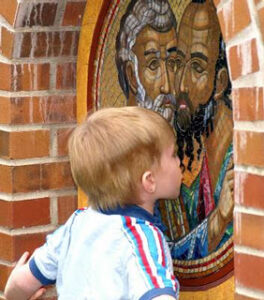I was rather refreshed to read Rachel Lu's
recent critique at
Catholic World Report. I don't share all her views on the subject she addresses (naturally enough, given that I'm loosely associated with the Spiritual Friendship crowd), but her balance and willingness to reflect bespeaks a thoughtful analysis, for which I am grateful, and I'd like to make some reply to her remarks. My reply is one consisting mostly of disagreement, but I hope I have disagreed respectfully (and apologize if I haven't).
One of her chief concerns is that the Side B* crowd sound a great deal like the surrounding culture, and that our concerns seem very largely to reflect theirs. She writes:
They lobby tirelessly for better support and affirmation for the same-sex attracted. But their advocacy mirrors the mainstream secular narrative in focusing overwhelmingly on broader social attitudes that they regard as defective (because they are insufficiently supportive or accepting), while shying away from any discussion of the defects intrinsic to homosexuality. ... [Helping same-sex attracted believers] is obviously challenging in a culture that is exerting enormous pressure upon religious groups to affirm same-sex desire as normative. It's disconcerting that the Spiritual Friendship group seems remarkably oblivious to this context.
I'd like to parse this a bit. I assume that Dr. Lu's objections are not to our focus on social attitudes just as such, since any kind of culture war is about nothing if not social attitudes. I gather that she reasons that the greater threat to the Church is the hostility of the secular world, as opposed to internal problems the Church has in loving and supporting LGBT people. I agree that I at least spend a great deal more time talking about Christian homophobia and its horrible ramifications in the lives of gay Christians (and ex-Christians), than I do rebuking the gay agenda or the rainbow reich or whatever we want to call it. This is partly because of how my own priorities are arranged, but it's also about the context of my audience. I expect -- and my e-mail and combox seem to bear this out -- that Mudblood Catholic is read chiefly by fellow Christians. I'm therefore far more concerned to urge the duty of charity upon them than I am to urge the duty of repentance upon those outside the Church, because talking about other people's sins to those who aren't committing them, even in the abstract, is at best an unproductive exercise.
If I had any reason to think that I were writing something read primarily by gay-identifying non-Christians, I would no doubt write very differently; but I don't expect that most of them would happen to be interested in a blog like mine -- why should they? -- and even if they were, I've consistently found that lectures on moral theology and natural law tend to fall flat on, well, most people really. It's noteworthy that, in His own ministry, our Lord mostly urged repentance in very general terms, except when talking to religious people, whom He rebuked with great specificity and open anger.
I would also say that, no, we are definitely not oblivious to the context of opposition to Catholic sexual mores in which we find ourselves. The people who believe it are our friends, our co-workers, our relatives, often our fellow parishioners. We carry around the at times heartbreaking reason for that opposition, inside ourselves. And we have been opposed, even at times attacked, by those willing to fight the Catholic beliefs that we hold dear. However much we may resemble secular culture, however much we may even owe to it, we've been told in no uncertain terms that we are self-hating bigots and responsible for homophobic beatings, murders, and suicides. No, we may be -- I certainly am -- many things, but we are not oblivious.
I cannot believe we had a supervillainous Octopope and got rid of him.
Turning to the question of culture war and arrangement of priorities, which I touched on above, Dr. Lu writes the following:
The modern Church is under assault from a secular juggernaut that would use homosexuality as an excuse to criminalize her teachings. This is a serious threat to the spiritual health and integrity of all faithful Christians, and the orthodox are scrambling to respond appropriately. This hardly seems to register with most members of this group. ... [Do they] realize that these bishops are probably scrambling to articulate their formal position in hopes of protecting orthodox priests ... from potential civil or criminal sanction? At such a time, is it reasonable to expect that "pastoral care for sexual minorities" should be a bishop's central concern? ... Any pastoral initiative that captures the media's attention (and that of the lightly catechized) will either be or be presented as a complete repudiation of traditional sexual mores. ... Realistically, then, orthodox pastoral outreach to the same-sex attracted will have to be conducted in the deep shadow of a much larger battle for the life and freedom of the Church. ... [G]iven the urgency of the situation, we really can't mute that message for the comfort of a small number of people.
On reading this last line, I thought instantly of the text in the Catechism which says, "The number of men and women who have deep-seated homosexual tendencies is not negligible." But that is not the meat of the argument.
I am the first to agree that the conflict between the Church and the World is vast -- and perennial; it exists today, as it existed a hundred years ago, and a thousand years ago. And we have always had the assurance of the Lord Jesus to Peter, that the Church was founded upon a Rock, and that the gates of Hell would not prevail against her. In consequence, I can't possibly agree that the life and health of the Church are in any peril from any amount of secular pressure, or even outright persecution. That the Church's freedom -- in the political sense, though certainly not in the spiritual sense -- is at stake, is in my opinion possible, if a bit premature to declare; but I categorically reject the idea that the Church's political freedom is in the least important when compared with the intimacy of one single soul with God, which is what pastoring exists for. The Church existed before she was legal, and will go on living if she is illegalized again (whether openly or covertly). It is only those individual souls who will last into eternity, in Heaven or in hell: but whether there be politics, they shall fail; whether there be blogs, they shall cease; whether there be a kulturkampf, it shall vanish away.
As to whether it's reasonable to expect pastoral care to be more important to bishops than protecting their priests from civil sanction, I think the answer ought to be a clear, resounding Yes. The Church is not in the business of maintaining her social or political status, however valuable those things may be; she is in the business of giving her children spiritual life, through the ministry of the sacraments, the preaching of the gospel, and, yes, pastoring them. And she is just as present within a jail cell as she is outside of it.
Of course, this is embarrassingly easy for me to write, since I am not personally in danger of being imprisoned for my convictions (that I know of -- though perhaps my posts on Edward Snowden have earned me a "giggles" file on some government watch list or other). Still, it is, I believe, true, and my own dubious character can't alter that.
That the Church's No is louder than her Yes may be an inevitable consequence of a culture war, but in my opinion, so much the worse the culture war. Jesus never ordered us to wage one in the first place. And her No may not be directed at the scared Catholic teenager, struggling to come to terms his feelings for his male best friend, but he's going to hear it all the same. And I speak both from my own experience and from the stories of my friends when I say that, for ninety-nine sheep out of a hundred, whether they wait around for pastoring depends largely on what they think the pastor will say and do to them, and that expectation is formed by the Church's public statements.
Returning to Dr. Lu's argument, she asserts that the adjustment in our perspective that she urges is necessary for an orthodox, adequate ministry to same-sex attracted people:
Of course we should not heap gratuitous burdens on the already-afflicted, but it's essential to be clear about the truth. Is it possible to do this without some hard feelings? ... Personal narrative has its advantages, but it can also undercut discussion insofar as it puts the narrator in a privileged class (which in some cases may mean a privileged victim class), implying that outsiders can have nothing useful to contribute ... In calling for greater solicitude, the Spiritual Friends seem to acknowledge that same-sex attraction is an enormously important, life-defining condition that demands serious attention from the Church. On the other hand, when it comes to the defective aspects of same-sex attraction, they have a tendency to minimize its significance ... protesting any attempt to refer to people as "disordered" simply because they desire disordered acts. ... In short, it seems the Spiritual Friends wish to enjoy simultaneously the solicitude due to the sick, and also the respect that is naturally paid to the (mentally and morally) healthy. This is not an unusual quandary, but it is genuinely problematic, particularly insofar as it ties the hands of those who are genuinely anxious to help.
It's perfectly true that "privileged victims" exist, and also that shutting those who aren't part of a given minority out of conversations about that minority, isn't really helpful or fair. It is, I think, equally true that victims are not simply a privileged class, and that members of a given minority know best where their own shoes pinch, and should be given, not an exclusive, but (as it were) a privileged voice in such conversations.
I will readily plead guilty to the assertion that I at least minimize and downplay the defective aspects of same-sex attraction. My reasons for this are, first, that I don't like thinking about them, since my life largely (though not overwhelmingly) consists in them: my vocation is far more restricted and confusing to me than I had hoped, I expect to be childless, and so on. Along with that, there's the fact that these disadvantages hardly need to be emphasized. But more than that, in both my personal experience and historical study, I haven't found any consistent negative aspects of homosexuality other than itself. It's common in Christian circles to assert that homosexuality is linked to depression and other psychiatric illnesses, a broad trend of moral degeneration, pedophilia, and a laundry list of other personal and societal woes; but I haven't found any reliable evidence (scientific, historical, or even anecdotal) that any of this is true. In consequence, I don't claim to know about the defective aspects of same-sex attraction of which Dr. Lu speaks, and therefore, I don't speak of them.
As far as disorder and sickness are concerned, I would note a couple of things. First, resistance to calling people, as opposed to acts or desires, disordered, does not originate with Spiritual Friendship. It originates with the Church's own documents on the pastoral care of gay people, which go out of their way to say that the person as a whole is not disordered. To call an act disordered, in the technical vocabulary of Catholic theology, means no more than to say that it is misdirected; to call a person disordered is, in the same vocabulary, meaningless, and in the vernacular, means that they are diseased and/or insane. The Church doesn't teach that, and I don't believe it.
Secondly, I take exception to the (apparent) idea that sick people do not need to be accorded respect. I don't think that respect for any person should be based on their conditions or circumstances, but on the mere fact that they are human beings, icons of the Divine Creator. One may of course have to work around someone's conditions or circumstances, but that's nothing to the purpose. (I would, too, say that what I tend to look for, and what I think I read in the authors of Spiritual Friendship, is that care given rather to the injured than to the sick; but perhaps that is only a quibble.) Accordingly, I don't see how asking for respect and care in any way ties the hands of those who wish to help us.
There
is one passage of Dr. Lu's piece that I don't merely disagree with, but seriously object to.
[Some people] view the Spiritual Friends less as a victim class, and more as the fortunate and blessed ones who successfully avoided the more egregious wounds to which the same-sex attracted are vulnerable. ... Noting this see-no-evil approach, I have occasionally wondered whether there might be a strain of "sexual anorexia" in the Spiritual Friendship school, enabling them to enjoy the sense of power that they get from proximity to temptations to which they have not actually succumbed.
This, I find disgusting, less for its ugly speculation on our private sexual qualities than for its ugly speculation on our private spiritual qualities. I've only rarely had to deal with a confessor or a director who was so ready to intrude on the recesses of my soul. That said, I can assert that I am wholly free of this particular fault, since (unlike most of Side B) I'm too slutty to be considered even within spitting distance of not-succumbing to temptation.
Returning to the much pleasanter aspect of mere disagreement, she (nearly) concludes her piece in this way:
Whether or not this is so, it leads us naturally to an important question, which only the Spiritual Friends can answer for themselves: do they genuinely wish to be well? The question is admittedly presumptuous, and may even seem a bit obtuse, but their extensive narrative invites it and of course we already know that attachment to defect is part of our fallen condition. We should properly admire those who are willing to labor under burdens that God has not yet seen fit to remove from them. It's quite another thing, however, to be attached to those burdens ...
A different thing indeed! As great, I am tempted to say, as the difference between duty and joy, justice and love, sober obedience and glorious abandon.
A thorn was given me in the flesh ... Three times I pleaded with the Lord about this, that it should leave me. But he said to me, "My grace is sufficient for you, for my power is made perfect in weakness." Therefore I will boast all the more gladly of my weaknesses, so that the power of Christ may rest upon me. For the sake of Christ, then, I am content with weaknesses, insults, hardships, persecutions, and calamities. For when I am weak, then I am strong.
I am no St. Paul, but I try to take my cue
from him in this -- and from the Lord Jesus, who did not heal His sacred wounds in the Resurrection, but preserved and glorified them. I've no doubt that I have a great deal of mere laxity and self-conceit in my attitude toward my sexuality, but, having tried shame for a couple decades, I've found that it doesn't work as a tool to bring me closer to God. As far as wishing to be well -- if wellness is understood as whole union of myself with God, then yes. If it's understood in any other sense, I don't believe that it's truly worth my time.
Caravaggio, The Incredulity of Saint Thomas, 1602.
*For those not already familiar, Side B is a sort of nickname for those of us who regard ourselves as gay, bisexual, trans, or otherwise queer, but affirm the traditional Christian doctrine that sex is rightly reserved to monogamous, heterosexual marriage. The nickname's origins need not detain us for the moment.









